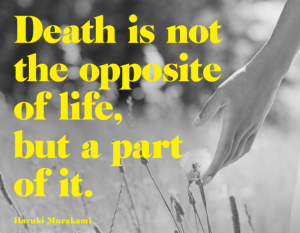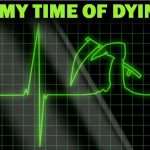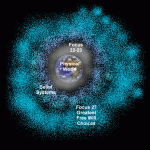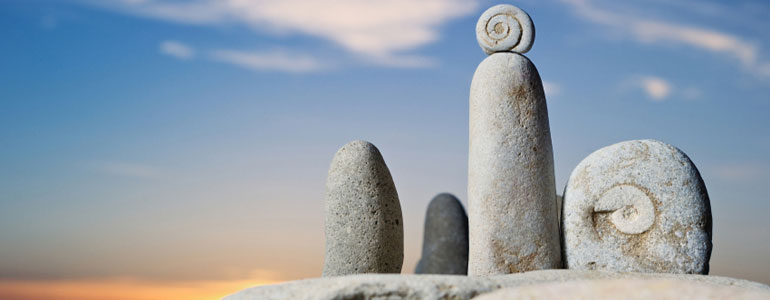‘Change Our View of Death’
Author Paulina Howfield, Copyright 2008 (written and published in print in 2008)
 In the western world death and dying are taboo subjects. To our culture they are about loss and annihilation rather than liberation and freedom, and preparing for them is generally inconceivable.
In the western world death and dying are taboo subjects. To our culture they are about loss and annihilation rather than liberation and freedom, and preparing for them is generally inconceivable.
On the whole we would much rather talk about our latest achievements, most recent purchases, or what we will have for the next meal, than discuss our own cessation of life. For many, talking about death and dying is morbid and frightening! For some it is like writing a will – it calls death too close for comfort, and somehow welcomes the grim reaper to our door.
Dying Is Our One Certainty
 Yet the death of the physical body is the only certainty in this life that we have. And it’s a fact that cannot be disputed. Therefore it seems odd that this culture that is so focused on facts and measurable certainties has mostly chosen to ignore death and dying and aim instead for life at all costs.
Yet the death of the physical body is the only certainty in this life that we have. And it’s a fact that cannot be disputed. Therefore it seems odd that this culture that is so focused on facts and measurable certainties has mostly chosen to ignore death and dying and aim instead for life at all costs.
Why I wonder, are we not following the guidance of our Renaissance philosophers, or our 12th Century medicos and doing all that we can to deprive death of its strangeness? And why especially do we not follow the wisdom of the philosopher Montaigne who said we should learn how to prepare for death and make it our friend?
‘Practicing death is to practice freedom,’ he told us. ‘A man who has learned how to die has unlearned to be a slave.’
Perhaps we ignore our wise forebears because here in the west we want rational, implicit, sequential explanations of what happens and what exists. If there is something we cannot fully understand then we will investigate it using science and logic, and we will measure and test repeatedly until we can prove without a doubt the certainty of something.
The Three Unknowns About Death And Dying
 While death of the physical body is an absolute certainty, there are three fundamental ‘unknowns’ or unanswered questions that we all have about death and dying.
While death of the physical body is an absolute certainty, there are three fundamental ‘unknowns’ or unanswered questions that we all have about death and dying.
The first two ‘unknowns’ of death are – When will death happen? and How will we die?’
While modern medical science has taught us how a body goes through the dying process, what may have caused the dying process, and when a body is likely to die from that process, we still cannot test and measure when we may be hit by a bus, shot in the street, or paralysed by a stroke. Or, when we may simply go to our bed to rest and not wake up. These aspects of dying therefore still remain in the realms of the unknown.
The third fundamental ‘unknown’ of death is – What happens to us when we die?
Science has a problem with this question because any understanding of it, and all discussions about it, focus on spiritual and religious beliefs, personal experiences, collective suspicions and emotional responses – none of which stand up well to scientific testing.
As a result, until recently, we have predominantly discounted the ancient cultures of the world that have spent centuries studying what happens after the death of the physical form, and we have ignored their discussions about where the spirit goes and how it moves back to source, simply because the very nature of these cultures is spiritual and their results cannot yet be proven according to science.
 Furthermore, while researchers like Raymond Moody have done extensive interviews with subjects who’ve had near-death and out-of-body experiences proving that losing the physical body is not the end of life, many of the reports of these experiences have been considered anecdotal. Also to some scientific critics and skeptics they merely prove what can happen to the mind and body when they are under stress, rather than prove the truth of what really happens when we die.
Furthermore, while researchers like Raymond Moody have done extensive interviews with subjects who’ve had near-death and out-of-body experiences proving that losing the physical body is not the end of life, many of the reports of these experiences have been considered anecdotal. Also to some scientific critics and skeptics they merely prove what can happen to the mind and body when they are under stress, rather than prove the truth of what really happens when we die.
So if we can’t prove for certain when and how we may die or what happens at death, and we don’t want to engage with the spiritual path, or believe the anecdotal evidence, then we ignore these things, and act as if death isn’t important.
Instead we focus only on what we know. And what we know of course is ‘being alive’. Therefore our day to day world involves staying alive at all costs, beating disease, preventing the aging process and not engaging with death. Because thinking about death and dying takes us out of rational experiences of the world and the safety of ‘certainty’ and leads us into the intangible realms of emotions, beliefs, instincts and suspicions. All of which are unpredictable, hard to measure and difficult to grasp by the left hemisphere of the brain – which is the type of the thinking favoured by the West.
Change Our View of Death
 Fortunately increasing numbers of us want to engage with and learn about the intangibles in life. We are starting to realise that the very nature of these intangibles is what gives life meaning and enables us to step out of the paradigm of fear and suspicion of death. They also help us to explore the meaning behind the three unknowables and discover why it is important to explore, engage with and prepare for death.
Fortunately increasing numbers of us want to engage with and learn about the intangibles in life. We are starting to realise that the very nature of these intangibles is what gives life meaning and enables us to step out of the paradigm of fear and suspicion of death. They also help us to explore the meaning behind the three unknowables and discover why it is important to explore, engage with and prepare for death.
This is because awareness of death is not just a teaching about how to die, or a preparation for death, it is also an education about the process of living. By really learning to ‘live our dying’ and ‘live as if we are dying’, we start to understand how to truly get the most out of being alive.
On a practical level we start to see that life in a physical body is a finite thing. That the average woman will live 29, 200 days, while a man will get only 27, 720!
Yet each of these days is filled with opportunities to understand death and dying and what comes after dying – the re-birth – which is reflected in the movements and cycles of the natural world.
Every twenty four hours, of our life, the Sun will be born and the Sun will die. Every three months a season will be born and three months later that season too will die. That season will return again, and it is likely to be different the next time round, because it will be unique, just like humans, plants, trees, animals, rivers, and rocks. But its cyclic nature will highlight that nothing that exists in this world is permanent, yet everything that exists in this world will be re-born again.
Nothing In Life Is Permanent
 Exploring death and making it our friend, doesn’t just help us change our view of death, it also helps us embrace the many changes that life brings. Throughout our lives people come and go. So do our homes, pets, jobs, and relationships. Again our world is always reflecting back that nothing is permanent. However these reflections and cycles of death and rebirth can teach us how to embrace what is present, how to get the most out of our interactions and how to accept loss without feeling annihilated.
Exploring death and making it our friend, doesn’t just help us change our view of death, it also helps us embrace the many changes that life brings. Throughout our lives people come and go. So do our homes, pets, jobs, and relationships. Again our world is always reflecting back that nothing is permanent. However these reflections and cycles of death and rebirth can teach us how to embrace what is present, how to get the most out of our interactions and how to accept loss without feeling annihilated.
Facing death and living each day as if we are dying, also helps us to let go and surrender. We learn that any control we have is created through the choices we make. Living with death knocking at our door, helps us decide how we want to interact, who we want to interact with and how we want to be when we do interact.
Life Is A Spiritual Journey
 It also teaches us that life is a spiritual journey. A journey that is aimed at helping us fully remember who we truly are. To remember that this is only one of many lives we may experience and that we volunteered for it in order to use our human bodies as vehicles for our soul’s development.
It also teaches us that life is a spiritual journey. A journey that is aimed at helping us fully remember who we truly are. To remember that this is only one of many lives we may experience and that we volunteered for it in order to use our human bodies as vehicles for our soul’s development.
The fact that we have forgotten when and how we will die and what happens after it is all part of the plan. The plan to ensure that every single human being can fully experience personal responsibility, freedom of choice and free will, while we attempt to remember who we truly are. It is a great cosmic joke and one that every single person who is alive on this planet volunteered to be a part of it.
Dying Is The Beginning Of A New Cycle
 Death is not the end, but the beginning. Living our dying and preparing for death is not fatalistic and it is not morbid. It allows us to truly live this life while preparing to go home again.
Death is not the end, but the beginning. Living our dying and preparing for death is not fatalistic and it is not morbid. It allows us to truly live this life while preparing to go home again.
It helps us understand our true nature and gives us a better chance of fully remembering who we are, why we are here and where we come from.
By embracing death and all it brings, we can also explore how to die well. We can learn techniques to help the body release its grip on life and assist it in preparing for its time of death.
